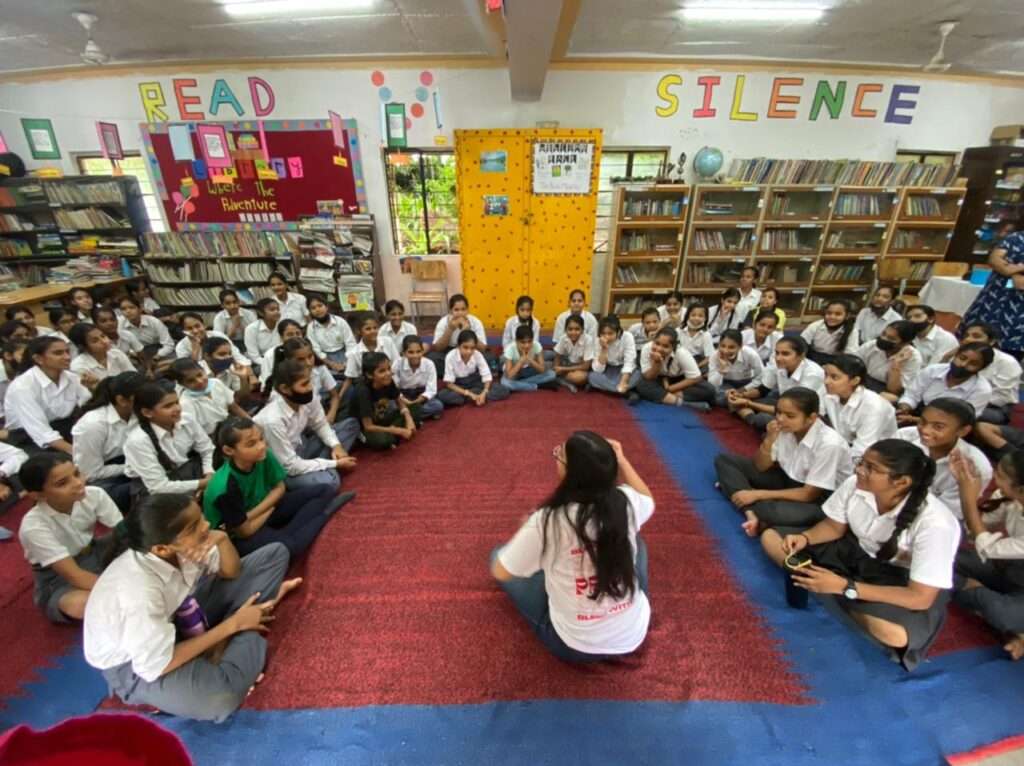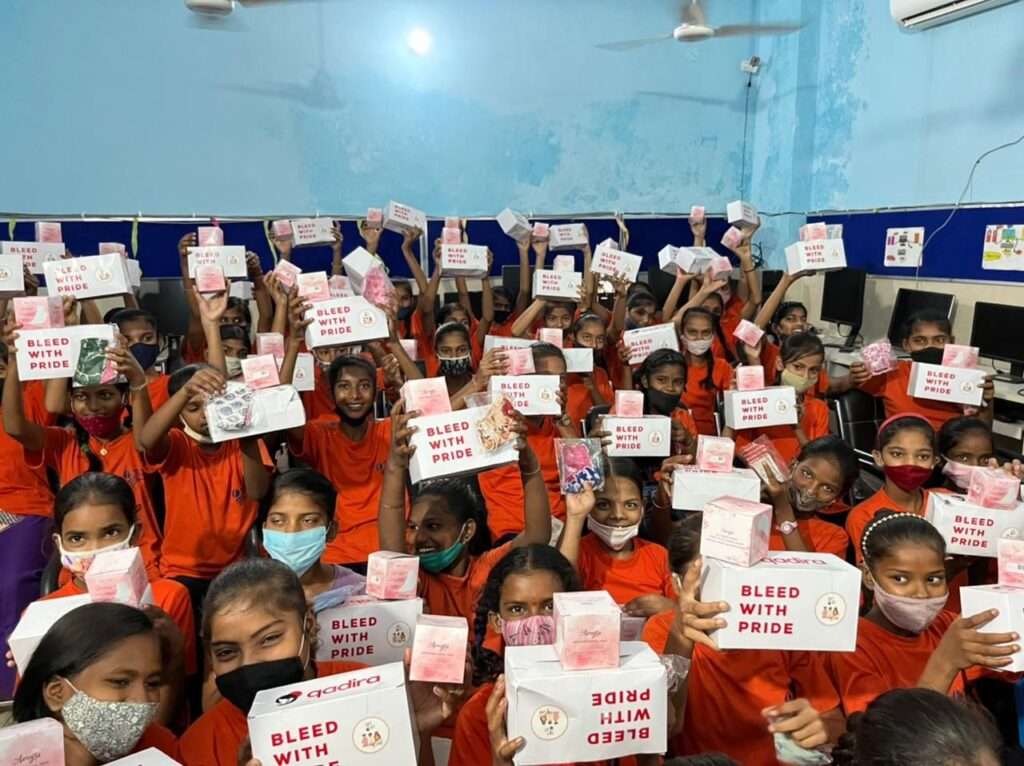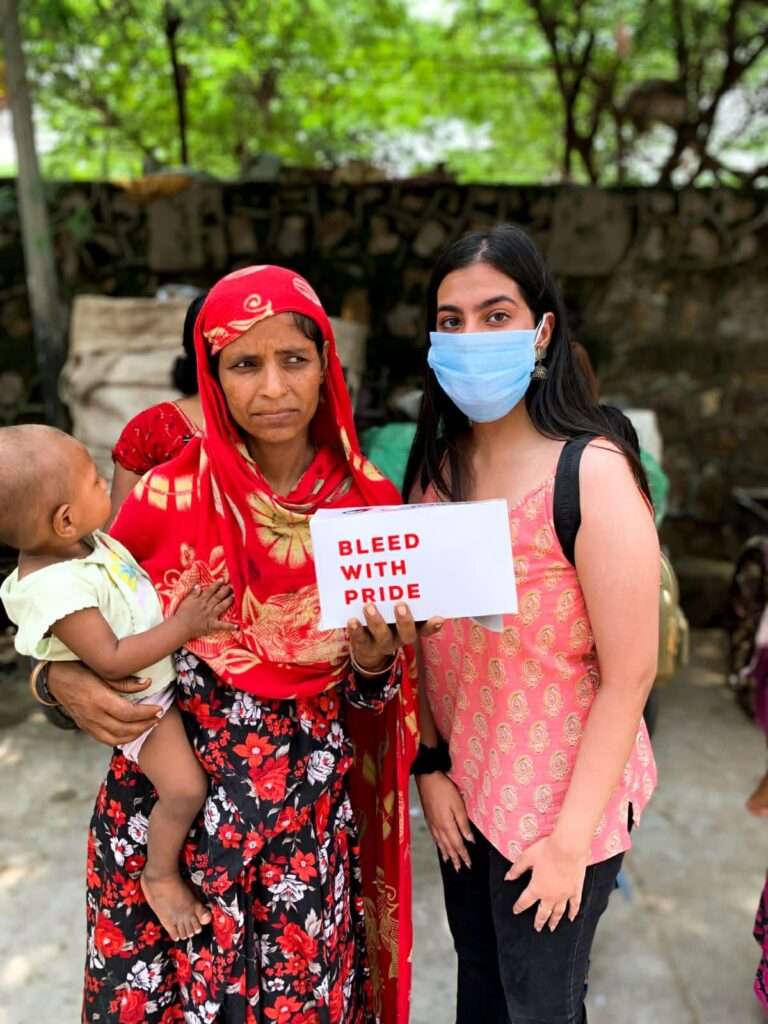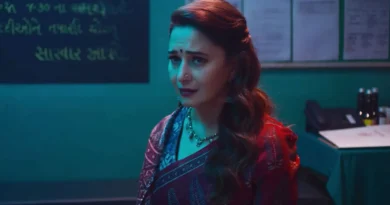A Conversation with Drishti Makhijani: Founder of Project Qadira and Qadira Hygiene
This is the interview of Drishti Makhijani, a 20-year-old changing the world one period at a time. She is a CS
student, a kathak dancer, and a visual artist. She is the founder of Project Qadira and Qadira
Hygiene.
Project Qadira is a student-led impact project advocating sustainable menstrual
hygiene and menstrual literacy in India. Qadira Hygiene is a D2C menstrual hygiene brand
that launched its first product recently and aims to become a brand that symbolizes
accessibility, affordability, intersectionality, and inclusivity. She is very interested in
discourses regarding the empowerment of underprivileged communities, period poverty, and human rights. She has agreed to meet me to learn about her initiatives, journey, and opinions
on some of the most stigmatized social issues.

Sriguna: Drishti, what made you come up with the idea to start Project Qadira? And what
encouraged you to think about menstrual hygiene and the empowerment of
menstruators?
Drishti: Project Qadira started as an Enactus project. I think the idea was with me for a long
time, but I did not have the right place, resources, and support to get the idea to fruition. Enactus at our university gave me that support system, and that’s why it feels like an idea that was brought through Enactus. But it is more to do with what I witnessed around me and the condition of menstruators in the communities I’ve visited.
This is back in 2020 when I identified a vast gap and realized that period poverty was a
significant problem in India that went beyond a few articles. I saw a lot of NGOs doing their
bit when it came to distribution drives. But, in the same areas where the distribution drives
have been conducted, I saw no actual change because the menstruators were not using the
product, they were not going to buy it, or they had not ensured a continuous supply of it.
What stood out to me was that there was a problem but no proper solution. Multiple solutions were there, and many NGOs were doing various things, but very few addressed menstrual hygiene holistically, where Awareness, Accessibility, and Affordability (3As) were ensured.
The incident that made me realize that 3As were not ensured and prompted me to actively
look out for proper solutions was an interaction with a 35-year-old woman with two kids. I
was talking to her and realized that she did not know that childbirth and menstruation were
connected processes. She had the resources to buy a pad, and there were also small stores
selling those, but she still did not use the proper hygiene products. So, I thought that the
problem was not the problem of accessibility or affordability because, as I said, many NGOs
and companies are doing their bit by bringing out affordable options in the Indian market.
The problem was her lack of awareness of human anatomy and her own body or bodily
functions.
If the menstruator did not know it, how can I expect a non-menstruator to know and
understand such an important concept? This lack of awareness led to much misinformation,
myth, and taboo building. We needed to do something about it, and Project Qadira was born
primarily with the idea of making the products available. But most importantly, before the
products, we had to change the mindset through our workshops, increase acceptability and
prepare the community for what must be done. We ensure that they understand the value and
usage of menstrual pads, adapt to them quickly, and make them a part of their life.
Sriguna: Amazing! Along with distribution drives, Project Qadira conducts a lot of
workshops. So, what do the workshops contain? How do you take them to the right
audience?
Drishti: Workshops are the heart and soul of Project Qadira. These workshops are done after
a lot of research and are made to reach the lives of underprivileged menstruators. Back in the
day, when we stepped out for drives, we saw that if we went to the place and bombarded
them with the information, they really did not understand it, or many just heard it and forgot
about it later. I mean, even though we were privileged enough to go to big private schools in
cities, the concept of puberty was not appropriately introduced in our classes, it was brushed past, and we were bombarded with a lot of information that failed to capture our attention. So, naturally, we did not retain much information, although it was extremely important. India is such a diverse country, the target audience and their levels of understanding and awareness varied a lot, and we were very sure that every kind of workshop was not suitable for every demographic.
So, first, we segmented and understood the audience by doing our homework. We tried to analyze to whom we were going to take the sessions. We asked questions like where they stand, where they come from, and what their experiences are. Next, we worked on the kind of content we felt was suited to take to various audiences. Then in the step-by-step process, we made them interactive to retain their attention. We used lyrics of bollywood songs, quizzes, games, and puzzles, developed those fun elements, and put them all into the sessions. Now we have 17+ workshops catering to different target demographics in the country, and we were very careful with the choice of words and terms we used. We were as inclusive as possible and ensured that we were not excluding anyone. But at the same time, we did not explicitly make it a gender issue, as we wanted people to understand it through a humanitarian point where every person, irrespective of their identities, becomes
aware of basic concepts. As much as we work on the sensitization of menstruators, we work
on the sensitizing of non-menstruators because until and unless everyone is educated and on
the same mental level to perceive things similarly in terms of facts, we will not achieve our
goals.
During the workshops, we don’t give them rights and wrongs, even when we tackle myths
and taboos. That is one bit that makes our sessions very effective. We do not disregard them, and we do not disregard their myths and taboos. We at Project Qadira are a team of
empathetic people; we become friends with every participant, chit-chat a bit, and build
relationships with them. We try to go to their level and try to look at things from their
perspective instead of just going there and telling them, “You are wrong,” “you are wrong,”
and “you are wrong.” We will acknowledge and respect their beliefs and let them know that
we understand why they believe what they believe before we start each session. We are not
there to fight or make them feel they don’t know anything. Then with lots of love and
understanding, we will lay out all the information in a fun and entertaining manner so that
they will take back what they are supposed to.

Sriguna: Drishti, Are Project Qadira’s workshops sex-positive? Many people discuss the
concept of good and bad touch in sex education sessions, but I believe that the way
many take the concept to the kids is incorrect. They will explain those ideas to kids like
an order or a diktat but completely forget to make kids aware of their own bodies, or
they won’t dive deep to explain why, when, and how it is wrong. I think when it is said
as a rule or an order that must be followed, for a kid, it will be alright, but as they grow
up, many will understand it as an order to reject the sensations of sex organs and that in
turn might become a significant hurdle if they want to explore their sexuality.
Drishti: I agree with you; exploring their sexuality or even their own bodies could become a
hurdle. Our workshops are sex-positive, but we had to make sure that we are not very explicit
about it in workshops that we take to specific rural demographics. We have to accept that
India is not openly sex-positive, thanks to the patriarchy and the obsession of men to control
the bodies and choices of women. Unfortunately, many still view it as if we are promoting
sexual intercourse among kids; they also bring absurd arguments like “we are spoiling their
kids” or their so-called “sanskaar” or culture. They are not at a level to understand that we are
making their kids aware of their own bodies. The moment we get sex-positive explicitly in
rural areas, in the sense that if we talk about pleasure, it just blows out of proportion, and the
total environment changes.
After a while, we feel that uncomfortableness and heaviness in the air, and I am pretty sure
that the next time we want to go there, they will close their doors on our faces. We don’t want
them to miss out on the opportunity to learn about very important yet basic things just
because we are letting them know about the beauty of enjoying pleasure through their bodies.
So, we will cover all the other aspects in detail, and when we come to talk about pleasure, we
try to be implicit. In places where there is no awareness of fundamental concepts at all, we
will majorly focus on simple and basic concepts, but even then, we make sure that if they
want, they can very quickly build on that basic knowledge and unlearn a few things if
required, just like you and I did to know the intricacies of gender and sexuality. However, in
the urban spaces where we think that the audience and the elders are mature enough to
understand the information, we will provide as much as they need it.

Sriguna: I agree that giving them avenues to unlearn is also extremely important. Child sexual
abuse is rampant in India, and many just try to brush it under the carpet. So, what is
your approach to explaining it to the children in workshops?
Drishti: To tackle child sexual abuse, along with giving the helpline numbers and some more
basic information, we rely on the concept of good and bad touch. But the only thing we do
differently is emphasizing the feeling of bad or confusion rather than good or bad. It is a
known fact that many children will not have the mental capacity to distinguish between good
and bad. If the abuser is a family member or an acquaintance, which unfortunately is the case
many times, it gets more difficult for a kid to understand that it is bad or that they are being
abused. So, while we talk about sexual abuse, we emphasize the feelings of bad/confusion
rather than good/bad touch. We explain that if they feel bad/confused when anyone touches them,
it is the alarm telling them the right time to go away, speak up, and always seek help.
Sriguna: What do you think about the stigma around menstruation in India, even for the
upper class, upper caste, and privileged menstruators? And I feel that stigma and
taboos increase considerably when discussing marginalized or intersectional
communities. In fact, many people ignore them and they are excluded from the
conversations. How do you think it should be tackled?
Drishti: I think the taboo around menstruation in our country is because of a clean and
simple lack of awareness. If people are aware and view menstruation as a normal biologic
phenomenon, nobody in their right mind will stigmatize it. On top of a lack of awareness,
there is also a lot of ignorance. So, many people bring out religion and religious superstitions
and take them to another level. I mean, even if you view it from a spiritual perspective, if you
believe that God creates all individuals, you cannot possibly stigmatize a natural bodily
process of God’s creation.
I still remember that when I was in school, I had to go to the Infirmary if I got my period.
When is it that a person goes to the Infirmary? When the person is not well, right? You go to
the health center for medicine or when you’re not feeling well. Going to the Infirmary when I
had my periods made me feel as if something was abnormal with me, and I am sure that
many young menstruators will feel that way. No one in my school explained to me clearly
that menstruation is a normal bodily process. Many non-menstruators might think I am going
to the medical room because I am not well. A non-menstruating individual grows up in
complete oblivion about this process of the human body, and often, after they are married,
their partner, sometimes awkwardly, will have to explain it to them.
Such small things play a huge role in constructing the narratives and even stigma around
menstruation. When we examine menstruation through an intersectional lens, we can find a
similar situation for the marginalized communities too, but along with the lack of awareness,
the ignorance is multiplied manifold. Many are ignorant because it is just convenient. For
example, it is suitable for many not to consider having sex education workshop sessions in
Braille. We close our eyes and pretend it is not all the problem; even worse; we forget that
many vulnerable communities exist. So, they will be systematically excluded from the
conversations.
So, one solution that I can think of, and it is what Project Qadira does, we make sure to reach
out to everyone. We look at menstrual hygiene through an intersectional lens and ensure
everyone is included in our conversations. We follow simple methods like using the term
‘menstruators’ to make people aware of menstruating bodies but might not identify with the
common identities.
Sriguna: How was your journey till now? Are there any challenges you or your team have
faced?
Drishti: It is an interesting question because you are asking about the journey of the last one
and half years, and looking back feels slightly unreal (laughing). I don’t usually look back
and analyze or reflect upon my past. I am the person who believes that I have to live in the
moment and will mainly focus on the present. But I definitely enjoyed every moment of our
journey. When we talk about the challenges, we faced quite a few, but they are ubiquitous for
any organization. Many times, things felt like they were all over the place. Everything’s
going on left, right, and center, but I realized they are common while tackling social issues.
Some other challenges we faced were when we started, we had a problem with the funding,
and we sorted it out with the fundraiser. Then we had to get the right people on board and had
to make them stay with us; we had to keep all roles filled and shuffle them once in a while;
these are all minor things that every organization goes through.
Coming to the challenges we faced during groundwork, we actually started our groundwork a
year ago. Many people welcomed us, they enjoyed the workshop sessions, and we got
overwhelming support, but there were also a few instances where individuals were not so
okay, mainly when we talked about myths and taboos and also when we encouraged the
menstruators to question things. I think they felt we were challenging their religious or social
beliefs. This has been a challenge, but we started taking a systematic approach where we
made friends with the community’s gatekeepers, which made our work much more
manageable.

Sriguna: Any significant achievements you want to share?
Drishti: We’ve had many small and big achievements that we celebrated as a team. We
collaborated with reputed organizations in India. We have partnered with WASH United for
Menstrual Hygiene Management Day 2022. We successfully organized a nationwide sex
education campaign, ‘Pehel,’ this year, and now we are reaching globally by sharing our
resources. The appreciation and recognition we got over the year were also massive. But,
very honestly, as a team, we feel the happiest after every successful workshop session and
distribution drive. I did not see the team so delighted when we got listed everywhere or even
when we launched the brand (laughing). The young kids walking out of the room after our
sessions feeling more confident and optimistic about themselves, I think, is the most
significant achievement, and I don’t think anything beats that.
Sriguna: Now, coming to your recently launched brand, Qadira Hygiene, what made you start
your brand? The social media handle says it is a brand co-created with menstruators;
what does it mean and tell me everything about it?
Drishti: Intersectionality and inclusivity in menstrual hygiene management are the central
pillars of both Project Qadira and Qadira Hygiene. When we look at the menstrual hygiene
brands in India, many have been unrealistic and ignorant. Many brands have had a lot of
rainbow or pinkwashing, and we are entirely against it. The market also has a few drawbacks,
like if we want to use high quality or even a decent quality menstrual product, the prices will
go completely out of pocket. Many middle or working-class families would not be able to
afford them. So, without any option, I had to go to the standard brands that gave me rashes
and smell issues without any comfort, only because of the ones that did not were out of my
range. As a menstruator, I was tied to choosing between a decent quality product and my
price point. So, we needed to bring something well within our budget, was of excellent
quality, and was not called premium because I’ll never be able to understand what a premium
quality sanitary napkin is (laughing)
We wanted to make the napkins as comfortable as possible and make the absorption high
without any leakage. Even after a long time without changing, it would not give rashes or
make them feel uncomfortable (Ideally, we do not recommend it because it is not healthy, but
if you do, you will not face an issue); everything came from being a user, the problems they
faced and the expectations they have from a sanitary product and the brand. When we talk
about Qadira Hygiene, I always say that it is a brand we are co-creating with other
menstruators. Every menstruator’s feedback is what makes or breaks us. It is all about the
user and what they like or doesn’t like, and because we have resources, we can work on it and
give them what they want.
Sriguna: Great; as a brand, how is Qadira Hygiene trying to make menstrual hygiene more
inclusive?
Drishti: Qadira Hygiene also resembles what Project Qadira stands for, Awareness,
Accessibility, and Affordability, but the audience we are trying to reach with the brand is
different; their problems are different, and even their levels of awareness are also different.
As I said, as a brand, we are inclusive at the core. We try to be as inclusive as possible in our
language, which makes a difference. We also make a point to make our users aware of what
inclusivity is and what it is not. If you look at the packaging, website, or social media
handles, you will find a lot of statements and pointers that are facts that will make people
think and learn.
Our tagline is Bleed with Pride; we always use the term menstruators. We say our pads are
made for menstruators, by menstruators with love. We have a point in capital letters on our
packaging that says, “NOT ALL WOMEN ARE MENSTRUATORS AND NOT ALL
MENSTRUATORS ARE WOMEN.” We also do not put unrealistic expectations where
people dance and fly in the sky. We make their experience more comfortable so that
menstruators don’t have to feel worried, and we are doing it for all menstruators with a
vagina and uterus, irrespective of their identities.
Sriguna: Great, Is there any way to reach out to Project Qadira or Qadira Hygiene?
Drishti: Anyone can reach out to us any time through email or on our Instagram handles for
queries, feedback, or collaborations.
For Project Qadira (www.projectqadira.in) Email- projectqadira2020@gmail.com / Instagram- @projectqadira
For Qadira Hygiene (www.qadirahygiene.com) Email- qadirahygiene@gmail.com / Instagram- @qadirahygiene
And if you want to try out our products and give us feedback – https://qadirahygiene.com/collections/all



